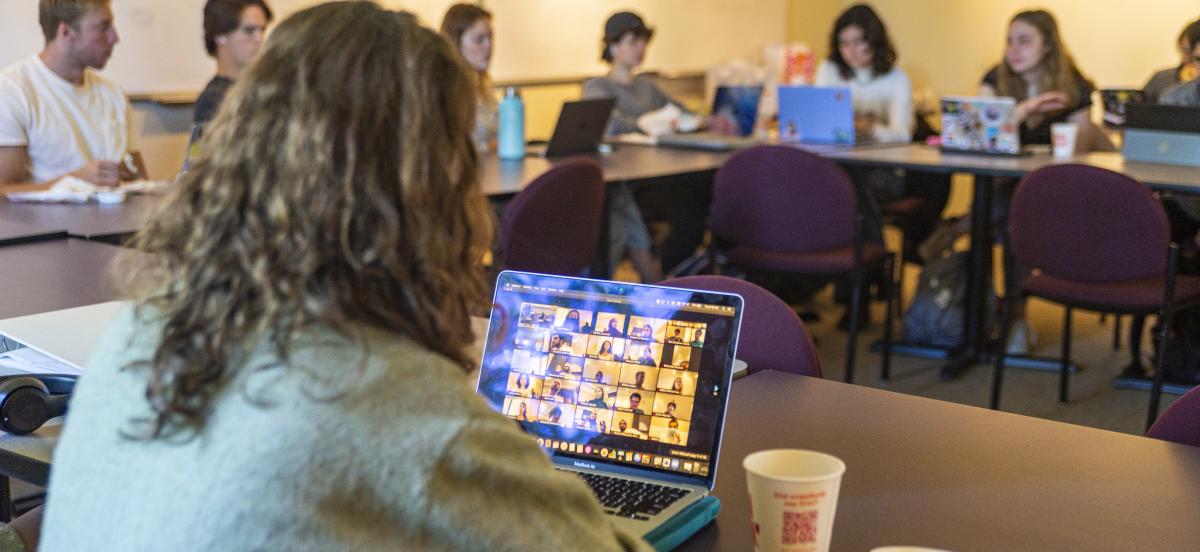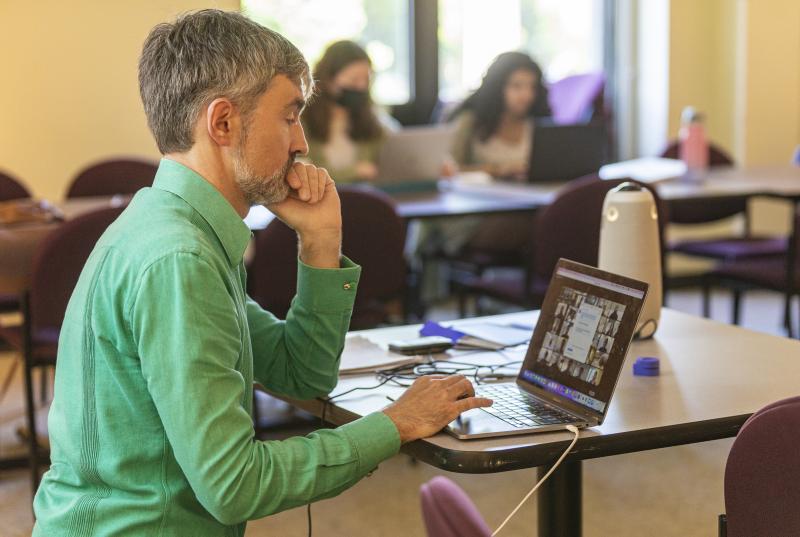CPGC Virtual Exchanges Connect Fords With Students in The United Arab Emirates

Students in Thomas Donahue's “Development, Human Rights, and Transnational Injustice” class meet virtually with students from the American University of Sharjah. Photo by Patrick Montero.
Details
Thanks to a recent grant from the Stevens Initiative, the Center for Peace and Global Citizenship is bringing a virtual exchange program with American University of Sharjah to four Haverford classrooms this year.
When Thomas Donahue’s “Development, Human Rights, and Transnational Injustice” class met for its third session of the semester, there were 25 new students in the room—via a screen. Those students joined the class, which examines theories of leading obstacles to peace and justice worldwide, from almost 7,000 miles away in Sharjah, United Arab Emirates, as part of a new virtual exchange program made possible by a recent grant from the Stevens Initiative.
That grant is funding the American University of Sharjah’s (AUS) Transformative Sustainability Project—one of four new projects supported by the Initiative to provide experiential learning opportunities for students in the UAE. The Transformative Sustainability Project connects AUS students with students at Haverford College, via the Center for Peace and Global Citizenship (CPGC), and Dickinson College for conversations around the UN Sustainable Development Goals.
“The Stevens Initiative helps advance peace by making international connections accessible for more students,” said Eric Hartman, executive director of the CPGC. “It's also a gateway opportunity. We're excited about how it will help more of our students understand that there are funded internship opportunities for them through the CPGC, specifically related to supporting humanitarian engagement in the Middle East, thanks to the generosity of our alumni.”
The virtual exchanges launched in classrooms earlier this fall when AUS students in Salma Thani's "History, Culture, and Society of the United Arab Emirates” course began visiting the Bi-Co students in Donahue’s “Development, Human Rights, and Transnational Injustices” every other week via laptops and a large projection screen at the front of the seminar room. By their second meeting, students had already broken into small groups to get to know each other and started work on a group assignment centered on a UN Sustainable Development Goal. Each group collectively selected a goal, and are now examining its progress and obstacles in two different geographic locations. One group, for example, is comparing gender equality in Mexico and Iran, as neighboring countries of the U.S. and the UAE, respectively.
“My students said that it was fantastic!” said Donahue, visiting assistant professor of political science. “We learned that we share far more with our AUS counterparts than we'd thought. And that we can learn a lot by giving up our North Atlantic perspective for a while, instead seeing things from the Persian Gulf.”

Donahue’s students concur. Though it is still early days of the exchange, the Fords involved report being interested not only in the connections they made, which they aim to bolster with meetings outside of class, but also in the way the collaboration is illuminating their course’s subject.
“I believe this exchange will be able to achieve the goal of the ‘Development, Human Rights, and Transnational Injustices’ course by giving us cultural inputs that we may not be able to get on this side of the world,” said Tanvi Jha ‘24, one of the students in Donahue’s class. “Truthfully, readings and discussions cannot fully replace cultural exchange through collaboration and interactions. By working with [the AUS students], we can understand the nuances of challenges in different countries with a holistic perspective.”
This year, three other Haverford classes, in addition to “Development, Human Rights, and Transnational Injustice,” will include a virtual exchange component with students from AUS: “Human Rights in Philadelphia and Pennsylvania in a National and Global Context,” “Intermediate Arabic,” and "Comparative and Transnational Studies."
The hope is that not only will students on both sides of the globe learn from new perspectives and build relationships, but that they will help solve problems while doing so. Using the UN Sustainable Development Goals as its basis for study means that at the heart of the exchange is a desire to use collaboration to drive positive change on some of the world’s most pressing challenges.
“At its best, global learning is always about seeding peace by pieces,” said Hartman, “ensuring individuals have opportunities to build relationships that transcend perceived fault lines while celebrating and respecting important differences.”
The Transformative Sustainability Project is supported by the Stevens Initiative, which is sponsored by the U.S. Department of State, with funding provided by the U.S. Government, and is administered by the Aspen Institute. The Stevens Initiative is also supported by the Bezos Family Foundation Foundation and the governments of Morocco and the United Arab Emirates.



